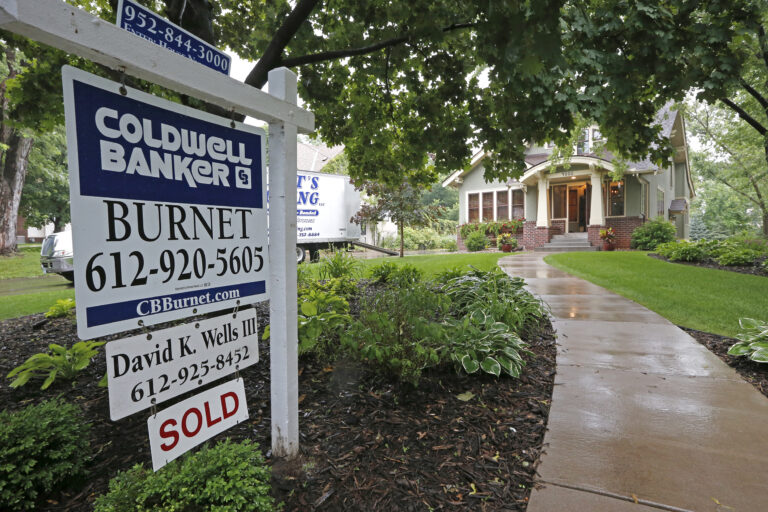A landmark settlement in a lawsuit against the National Association of Realtors could transform how homes are bought and sold starting on Saturday, potentially lowering commission costs and providing greater transparency.
But it could also complicate home purchases for first-time buyers and shake up the real estate brokerage industry.
“This is an opportunity for us to adjust and adapt. In this day and age, so many people are seeking out transparency, and this change in practices gives us that,” said Natalie Davis, a Realtor with Keller Williams Realty Downtown in Denver.
Although buyers and sellers alike could always negotiate terms, including the commission rate, with their agents, industry practice settled into a pattern where sellers paid commission costs in the 5% to 6% range for both sides of a transaction.
Home sellers in Missouri sued to end the practice, which they argued wasn’t fair and had them paying more out of pocket than necessary. The National Association of Realtors settled the case in March for $418 million and agreed to change some of its long-standing practices effective Aug. 17.
One of the biggest changes regards the posting of what a seller would pay an agent bringing a buyer to the table on the multiple listing service or MLS, which local Realtor associations have historically owned.
Agents could see the cooperative compensation information, but consumers didn’t have easy access. So long as sellers were footing the bill, wrapping the commission costs into the sales price, which lenders would finance, it didn’t matter much.
“No longer can real estate brokers put their commissions on the MLS. But they can put that information on their own websites. That is what you are going to see more of. But that will be up to each individual brokerage,” said Tyrone Adams, CEO of the Colorado Association of Realtors.
Buyer agents can contact the listing agent directly to obtain that information when it isn’t publicly available, an added step, but not a huge one.
Separating the commission information from platforms owned by Realtors was meant to address allegations of collusion, while also providing sellers more flexibility in compensating buyer agents.
“Sellers will need to be aware that by not offering compensation, they may diminish the buyer pool. It is the buyer’s choice, not the Realtor’s choice,” said Kelly Moye, a Realtor based in Northglenn.
Steering, or the practice of agents avoiding listings that are less favorable to them, is still prohibited. But it isn’t against the law for buyers to set such conditions.
That is where the tug of war will happen. A buyer who doesn’t have the extra money to cover their agent’s commission may want to limit the listings they consider to only those where the seller has agreed to pay.
But the starter-home market is also where homes sell the fastest and with multiple offers.
Even when the seller is willing to pay a buyer’s agent, showing up with a commission request below the competition could save a seller money and push an offer to the top, said Holden Lewis, a home and mortgage expert with Nerd Wallet in a blog post.
By negotiating on the front end with their agent, buyers can improve their chances when it comes to securing a purchase.
Agents will want to get paid — either by the seller or the buyer — and contracts will state that. But if the buyer is strapped, which is often the case with first-time buyers, they should try to negotiate terms.
“The contract will state how much you will pay the agent representing you either in a flat fee or a percentage of the purchase price, both of which are open to negotiation. Other elements up for negotiation include duration of the contract and geographic area (one or more addresses, zip codes, cities, and counties) for the scope of your search,” Holden said.
The settlement requires buyer agent agreements, which Colorado has long required. Even standardized contracts leave room for negotiating. If an agent isn’t willing to budge or can’t seem to justify what they are asking for in compensation, consumers are encouraged to look elsewhere.
“As to the regular contract with a financial obligation to compensate the buyer agent, they should not sign this agreement unless they’ve read and understood it and it’s fair to them,” said Stephen Brobeck, a senior fellow at the Consumer Federation of America.
Buyers should request a copy of the agent contract and review it closely before signing, avoiding agents who don’t provide an advanced copy. Buyers should always weigh the services they will receive against the costs.
“We suggest they aim at the dollar equivalent of 2% or less of the sale price,” Brobeck said.
The average buy-side commission paid on a home purchased in Denver was 2.56% in July, down from 2.64% in January, according to a study from Seattle brokerage Redfin. Denver had the 18th highest commission of the 50 metro areas that Redfin examined.
Home tours a sticking point
Most listing agreements don’t allow a buyer to show up and tour a home on their own, aside from an open house. Part of that is to protect sellers, who typically leave when a showing is held and who don’t want strangers walking through their personal space unaccompanied.
The National Association of Realtors, as part of its proposed settlement, is requiring that brokers sign a “touring” or “showing” agreement before taking a potential buyer through a property. It isn’t a full-blown buyer-agent agreement, but will likely discuss compensation should the person touring decide to buy a home.
“The idea is to provide transparency to the buyer regarding compensation and where it will come from,” Moye said.
The Colorado Real Estate Commission, however, argues that showing agreements aren’t required by state law and are part of licensed brokerage duties, said Marcia Waters, director of the Colorado Division of Real Estate.
“That isn’t a consumer-friendly practice and if someone wants to see a property, they shouldn’t be forced to sign an agreement,” Waters said, adding the commission has told the Colorado Association of Realtors as much in a letter.
The Real Estate Commission provides many standardized forms the industry uses, but hasn’t created touring agreements and doesn’t plan to, Waters said.
“If brokers are using touring agreements, they have to hire a licensed Colorado attorney to draft those,” she warned.
A tougher time for first-timers
Current homeowners who are trading up will typically have enough equity in their homes to cover the cost of an agent. They are also less likely to need hand-holding and can take on more tasks themselves. More concern is focused on first-time buyers.
“First-time buyers are those who need the agent the most. They are also the least likely to be able to afford their buyer agent compensation,” said Lindsey Benton, broker/owner of Live.Laugh.Denver. Real Estate Group.
Downpayment and closing costs are already a burden for many first-time buyers and covering agent fees will add to the upfront expenses that lenders still haven’t figured out how to roll into a mortgage. First-time buyers are also the most vulnerable if they try to go it alone.
The changes could revive less common practices, such as transaction brokers, who behave as arbitrators for both sides rather than fiduciaries for one side or the other, or using an attorney to draft a legally binding contract or buyer self-representation.
New technology-focused alternatives are already arriving. On the same day the NAR changes took effect, San Francisco startup Shay, which describes itself as the “first self-representation” platform for homebuyers, launched.
The tagline on its homepage is: “Buy a home without a realtor. Save $1000s.”
“Paying a real estate agent a fixed percent of a home transaction is simply a bad deal for many homebuyers. We enable homebuyers to save money by doing it themselves. This is similar to how TurboTax gives tax filers an alternative to accountants or Expedia gives travelers an alternative to travel agents,” said Peter Jeffrey, the company’s CEO and founder in a news release.
The platform offers more than 20 guides to help buyers with each step of a transaction and claims its AI models can generate offers, assist with negotiations and review agreements.
Adams counters that purchasing a home is the most complex transaction most consumers will ever undertake and having a trained professional assisting comes with important benefits.
“People will have more conversations about these things and understand what it means for them. That isn’t a bad thing,” he said.
Originally Published: August 17, 2024 at 6:00 a.m.
This article was originally published by a www.denverpost.com . Read the Original article here. .










